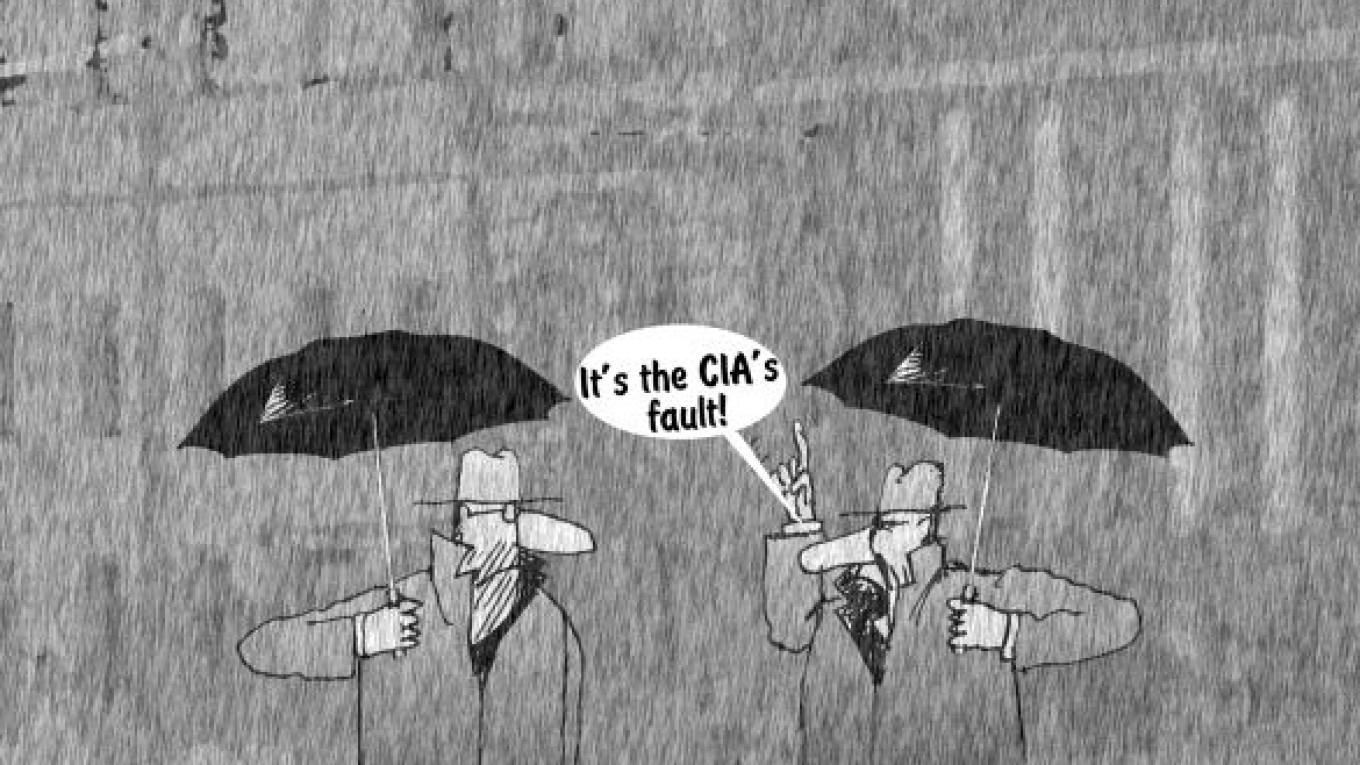It has become customary in recent decades to blame the United States for every catastrophe afflicting the planet — from tsunamis to revolutions. Before the United States, it was the Jews who were blamed for the world’s problems. In medieval Europe, for example, Jews were said to have spread the plague — and, ironically, the accusations were most virulent in those regions where Jewish people didn’t even live.
Governments have often blamed foreign elements for instigating revolutions. Opponents of the 1789 French Revolution considered it the fruit of an English and Lutheran plot, and Russian authorities considered the Decembrists to be French agents. Bolshevik leaders were thought to be agents of the German military, and Adolf Hitler viewed the Bolsheviks as part of a global Jewish plot. The capitalist West invariably implicated Moscow in national liberation movements of the 20th century, and the Kremlin was convinced that every right-wing dictator was a puppet of Uncle Sam.
But the truth is that all of these political upheavals were the result of internal forces. When the Soviet Union collapsed in 1991, many Russians thought that it was caused by the Central Intelligence Agency. No doubt, Washington did concoct various schemes during the Cold War to weaken the Soviet Union and possibly hasten its collapse — for example, drawing Moscow into an arms race by launching the “Star Wars” program and conspiring with Saudi Arabia to precipitate the collapse of oil prices in the 1980s.
But accusations that the CIA alone caused the Soviet Union to collapse are ridiculous. Why do Russians seemingly hold the CIA in such high regard? It can’t even uncover the simplest intelligence, much less cause the collapse of the Soviet Union. Take, for example, the 1979 Islamic Revolution in Iran. Shah Mohammad-Reza Shah Pahlavi, a close ally of the United States, had been ruling the country, and various individuals operating as U.S. agents filled his inner circle. Nonetheless, the Islamic revolution, which had been brewing for years, came as a complete surprise to the shah and his cohorts. Then-U.S. President Jimmy Carter summarily fired the CIA chief and decided to conduct a thorough housecleaning at the agency.
Nor did anybody in the CIA expect that the collapse of the Soviet Union would occur as soon as it did. After it happened, the U.S. Congress ordered an investigation to determine why the intelligence service did not predict the Soviet collapse, much less organize it.
The key reasons for the Soviet collapse had little to do with the United States. The reasons were internal, of course — not least among them were the perestroika reforms introduced in 1987 under Soviet leader Mikhail Gorbachev, who understood that the economy had no chance of surviving without at least a modicum of democratization and economic liberalization. But those democratic reforms ultimately caused the already weak Soviet foundation to collapse. The political kettle had been boiling for years, and as soon as Gorbachev opened the lid even a tad, the country experienced a violent overflow of opposition to Soviet rule in the Baltic states and an outbreak of interethnic fighting in the Caucasus. The political explosions sharply exacerbated the country’s acute economic woes.
Things did not go well for the former Soviet republics either after they gained independence. People expected conditions to improve, but instead they witnessed the emergence of oligarchic “bandit capitalism,” which resulted in a huge gap between the few rich and the many poor. The great disappointment, disillusionment and chaos in the decade following the collapse of the Soviet Union paved the way for new “color revolutions” in three former Soviet republics. The West may have funded some of the opposition forces, but it is ridiculous to claim that it caused these revolutions.
The Feb. 7 Ukrainian presidential election proved that the hyped-up claims of Western subversion in its color revolution was patently false. Conservative groups in Russia love to claim that the Orange Revolution was designed in Washington and that Yushchenko’s victory allowed the United States to control Ukraine and dictate Kiev’s “anti-Russian” policy. But when Yushchenko received only 5 percent of the vote in an election declared democratic by all international monitoring groups, this was a crushing defeat not only to Yushchenko, but also to the fearmongers in Russia who claimed that Washington had completely orchestrated the Orange Revolution. On the contrary, thanks to the democratic Orange Revolution, Ukrainians were able to remove an unpopular, pro-Western president through free elections.
Yevgeny Bazhanov is vice chancellor of research and international relations at the Foreign Ministry’s Diplomatic Academy in Moscow.
A Message from The Moscow Times:
Dear readers,
We are facing unprecedented challenges. Russia's Prosecutor General's Office has designated The Moscow Times as an "undesirable" organization, criminalizing our work and putting our staff at risk of prosecution. This follows our earlier unjust labeling as a "foreign agent."
These actions are direct attempts to silence independent journalism in Russia. The authorities claim our work "discredits the decisions of the Russian leadership." We see things differently: we strive to provide accurate, unbiased reporting on Russia.
We, the journalists of The Moscow Times, refuse to be silenced. But to continue our work, we need your help.
Your support, no matter how small, makes a world of difference. If you can, please support us monthly starting from just $2. It's quick to set up, and every contribution makes a significant impact.
By supporting The Moscow Times, you're defending open, independent journalism in the face of repression. Thank you for standing with us.
Remind me later.


